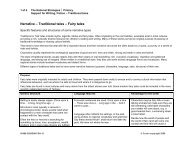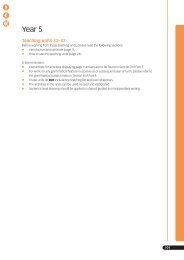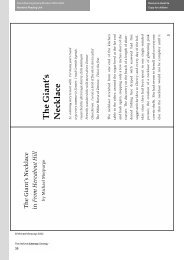Create successful ePaper yourself
Turn your PDF publications into a flip-book with our unique Google optimized e-Paper software.
�<br />
�<br />
�<br />
�<br />
�<br />
�<br />
�<br />
�<br />
�<br />
The poet’s repertoire<br />
Over time you will learn different forms that you can select for different occasions, e.g. raps for entertaining, haiku for<br />
memorable moments, free verse for serious poems and capturing experiences and ballads for story telling.<br />
Being true to the experience that you are writing about is more important than trying to squeeze words into a form.<br />
To write in any form you need to spend<br />
time reading good poems written in<br />
that form.<br />
Read like a writer – notice how poets<br />
achieve different effects.<br />
Borrow simple repeating patterns from<br />
poets and invent your own.<br />
Invent your own forms and structures.<br />
Be careful with rhyme. Forcing a rhyme<br />
can lead to dishonest writing.<br />
Go for the right word rather than a<br />
forced rhyme.<br />
Keep the writing concrete and detailed.<br />
Use your own poetic voice. Try to<br />
use natural language and invent<br />
memorable speech – listen for this<br />
in everyday speech.<br />
The Way I Write<br />
Sometimes if a poem is more complicated it helps me to have<br />
an example read out to me or if it is a more descriptive<br />
piece to have a picture infront of me that I could refer to.<br />
It also helps me to write pieces of writing out in rough<br />
because then I can get better ideas and I can add more<br />
feeling to it and change words that I don’t need or that I<br />
don’t want.<br />
Lynn Eldered Age 11 years<br />
Before I start a piece of writing I find it helps to talk about it<br />
first, because it sort of makes my mind clear of what I’ve got<br />
to do. Some of my best ideas come from my imagination. If<br />
an idea appears in my head I quickly jot it down in my rough<br />
book and when I have a series of fairly good ideas I begin to<br />
construct a piece of writing. I prefer to work in a noisy room<br />
because sometimes the words people use in their speech can<br />
help create a realistic atmosphere in my poetry. I usually<br />
write in rough first, because then I can change words that I<br />
think are boring or just don’t make sense.<br />
Alison Crock 11 years old<br />
I like doing a poem in a quiet place so that I can think of words<br />
to put in the poem. And I would do it in rough first so that I<br />
could change the words they don’t fit in with the rest of the<br />
poem. My best ideas come from the other poems I’ve done<br />
and from the mistakes I’ve made. I get my ideas sometimes<br />
from the scenery around me and sometimes from places I’ve<br />
been to. If I discuss how to do a poem it might help me,<br />
sometimes when I haven’t got an idea.<br />
Leyla Abdullah 11 years old<br />
Thanks to the poets and editors who contributed their ideas: Val Bloom, Morag Styles, Jean Sprackland of the<br />
Poetry Society, Brian Moses and Philip Gross. You can download this flier from the web and adapt it for<br />
direct use by children or to create posters for your writing area.<br />
DfES Publications Ref: DfES 0532/2001<br />
Tel 0845 60 222 60 © Crown copyright 2001<br />
Fax 0845 60 333 60<br />
Textphone 0845 60 555 60 Produced by the Department for Education and Skills<br />
e-mail: dfes@prolog.uk.com This document may be reproduced for non-commercial or training purposes on the condition that the<br />
source is acknowledged.








